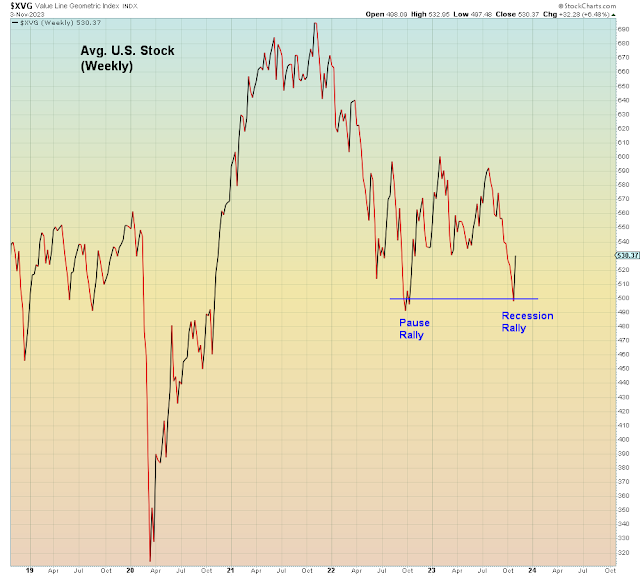From time to time, one must step back to put today's economic events back into their broader context. In retrospect, we now know that the 2008 global financial crisis placed the U.S. and developed world in a state of deflationary Japanification. No growth and 0% interest rates for a decade straight. It was a frustrating time to be an investor, because fundamentals no longer mattered. Only monetary policy mattered.
Fundamentalists believe that the economy and profits are what drive stock prices. Whereas Elliott Wave purists believe that sentiment and social mood are what drive the economy and stock prices, fundamentals merely follow. I am in the middle camp. I believe that there is a feedback loop between fundamentals and sentiment. When sentiment is RISK ON, demand increases, the fundamentals improve, profits follow. Higher profits stimulate asset prices which in turn raises speculative appetite. 2008 changed all that. Central banks were in direct control over markets for over a decade.
However, now the pandemic has put markets back at the mercy of sentiment and fundamentals. Central banks are no longer supporting markets at this late juncture. Whereas fundamentals can be hard to predict, sentiment is much easier to observe. In late 2021, global risk asset markets hit all time highs, followed by the 2022 bear market. 2023 has been a retracement correction of that bear market.
This is my weekly wave count. Note that the bear market of 2022 started the same way this decline is starting. With a falling wedge to wave 'i' down, followed by a bear market rally to wave 'ii' up.
Given that we saw this exact same pattern last year, today's unfolding collapse should be very clear to everyone, but it's not. Why? Because Wall Street relies solely upon their proprietary profit models to predict stock prices. What I call the Magic 8 Ball. Their predictions always fail at the end of the cycle.
Which is why it has never been more important to observe risk sentiment in order to confirm market direction. Below is a chart of airline stocks and consumer sentiment. What we notice is that both airlines and sentiment peaked prior to the pandemic. Subsequently, airlines have enjoyed two counter-trend rallies, each of smaller magnitude. Recently, airlines broke below the 2022 bear market lows, in an ominous sign for the rest of the stock market. During the pandemic, global travel was curtailed for two years straight. If any sector should have benefited from re-opening, it's airlines.
Another indicator of collapsing social mood can be viewed in the artificial intelligence Tech sector, which was the biggest bubble of 2023. These stocks have fallen into a bear market. Note also that they peaked back in late 2021 at the same time that monetary stimulus peaked. More proof that central banks exert tremendous control over markets. More than fundamentals AND sentiment combined.
Next, let's talk about inflation and the impending return of deflation. The sources of inflation emanating from the pandemic were first and foremost the unprecedented monetary quantitative easing which dwarfed the stimulus applied after 2008, or any other period in history. QE drove asset prices across the board to ludicrous extremes. Elon Musk saw his wealth increase 10x in less than two years. Yes, you read that right - from $30 billion to $300 billion. Owners of assets - homes, condos, and stocks - were made instant millionaires. Mostly Boomers. Meanwhile younger generations were locked out of over-priced markets and then systematically bilked by rampant pump and dump schemes. Think of the collapsed FTX crypto exchange and Sam Bankman who was just convicted this past week of rampant fraud. The Big Short author Michael Lewis was calling this criminal a "genius" right before FTX collapsed. You can't make this bull shit up. The amount of fraud in this era eclipses any other era in modern history. Nevertheless, the millionaire/billionaire wealth effect continues to drive inflation across the economy. Meanwhile, retailers are warning that middle class and low income consumers are imploding:
“Wealthier folks are still spending, especially on international travel, blowout entertainment and other services and experiences”
"...low-income families are pulling back now that federal stimulus and pandemic-era savings have run out, and middle-income families, who are “selectively trading down” by buying paper towels at the dollar store"
Pandemic stimulus was a source of inflation, but those programs ended two years ago. Interest rates cuts fueled inflation for a time, but rates have now tripled from their levels before the pandemic. Which leaves interest rates above their 2007 levels.
In other words, we are to believe that the post-2008 deflationary paradigm is over, having been replaced by even more extreme asset prices, far more debt, and sky-rocketing interest rates.
Here we see that home prices have continued to defy gravity. However, back in 2007 home prices didn't implode while rates were rising, they imploded while rates were declining.
And guess what, interest rates are set to now decline.
In summary, the party is over. But the wealthy are still partying like it's 1929. Because, guess what, for them that's what this is.
Position accordingly.






